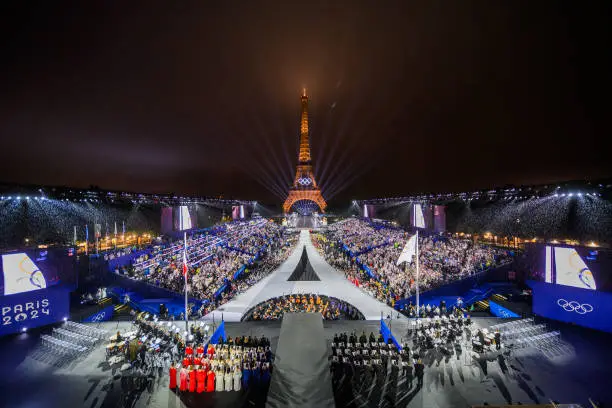
Overview of the Olympic Games and Major Sporting Events
The Olympic Games and other major sporting events hold a unique place in global culture. These international competitions not only represent the pinnacle of athletic achievement but also serve as platforms for cultural exchange and international collaboration.
The Olympics, dating back to ancient Greece, were revived in 1896. Since then, both the Summer and Winter Olympics have captivated audiences worldwide with a range of sports, from track and field to skiing and ice skating.
In addition to the Olympics, several other major sporting events have become global phenomena. The FIFA World Cup, Grand Slam tennis tournaments, and the Tour de France are iconic events on the international sports calendar, attracting millions of fans and showcasing top athletes.
History of the Olympic Games
Origins of the Ancient Olympic Games
The ancient Olympic Games began in Olympia, Greece, around 776 BCE. These games were religious festivals honoring the Greek god Zeus, featuring events such as running, wrestling, and chariot racing. Held every four years, the ancient Olympics were a central element of Greek culture until their discontinuation in the 4th century CE.
Revival of the Modern Olympic Games
The modern Olympics were revived in 1896 by French educator Pierre de Coubertin, who envisioned them as a means to foster international understanding and peace. The first modern Games took place in Athens with 14 countries and 241 male athletes competing in 43 events. Since then, the Olympics have expanded significantly, with the 2020 Tokyo Games featuring over 11,000 athletes from 206 countries across 339 events.
Types of Olympic Games
Summer Olympics
The Summer Olympics are the most well-known and largest of the Olympic Games. They feature a broad spectrum of sports including athletics, swimming, gymnastics, soccer, and basketball. Iconic events include the marathon, 100-meter dash, and gymnastics all-around.
Winter Olympics
The Winter Olympics focus on snow and ice sports, such as skiing, skating, and ice hockey. First held in 1924 in Chamonix, France, the Winter Games have become a celebrated part of the Olympic tradition, highlighting the skills of winter sports athletes.
Paralympic Games
The Paralympic Games are dedicated to athletes with physical, visual, intellectual, or sensory disabilities. The inaugural Paralympic Games were held in Rome in 1960. They have since become a respected and celebrated aspect of the Olympic movement, showcasing extraordinary athletic abilities.
Impact of the Olympics on the World
Social Impact
The Olympic Games symbolize international cooperation and understanding, bringing athletes from around the globe together. The Games foster cultural exchange and promote global unity, upholding values of sportsmanship, fair play, and respect.
Economic Impact
Hosting the Olympics can significantly impact the host city or country economically. Benefits include increased tourism, infrastructure development, and global visibility. However, the high costs of hosting also raise concerns about the long-term financial implications.
Sporting Impact
The Olympics have profoundly influenced the growth and development of global sports. The Games enhance the visibility of various sports, leading to increased grassroots participation and investment. They also provide a platform for introducing new sports, such as breakdancing, which will debut at the 2024 Paris Games.
Other Major Sporting Events
FIFA World Cup
The FIFA World Cup is one of the most-watched sporting events globally, with billions of viewers following the tournament. Held every four years since 1930 (except for 1942 and 1946 due to WWII), the World Cup has become a major cultural event, showcasing national identities and heritage.
Grand Slam Tennis Tournaments
The Grand Slam tennis tournaments—Wimbledon, the French Open, the US Open, and the Australian Open—are the most prestigious in tennis. They attract the world’s top players and are significant events in the sports calendar, with Wimbledon noted for its rich history and traditions.
Other Major Events
Besides the Olympics and World Cup, several other major sporting events hold global importance, such as the Tour de France in cycling, the Super Bowl in American football, and the Cricket World Cup. Each event has a unique history and impact on the sports world.
Challenges and Controversies
Political Issues
Major sporting events often face political controversies, including boycotts and human rights concerns in host countries. These issues underscore the complex intersection of sports and international relations.
Economic Concerns
The financial burden of hosting major events can be substantial, involving costs for infrastructure, visitor accommodation, and event organization. This has led to debates about the economic sustainability of such events.
Ethical and Social Issues
The sports world contends with ethical challenges like doping scandals, athlete safety concerns, and the need for greater inclusivity and diversity. Efforts are ongoing to uphold sports integrity and promote positive social change.
The Future of Major Sporting Events
Technological Innovations
Advancements in technology are reshaping the future of major sporting events. Innovations in broadcasting, data analytics, and artificial intelligence are enhancing how sports are experienced and managed.
Sustainability
There is a growing emphasis on environmental sustainability in major sporting events. Initiatives aim to reduce carbon emissions, minimize waste, and promote eco-friendly infrastructure development.
Inclusivity
Future major sporting events are focused on increasing inclusivity and accessibility. This includes ensuring equal opportunities for athletes with disabilities and promoting diversity at all levels of sports.
Conclusion
The Olympic Games and other major sporting events inspire and unite people globally. They transcend borders, celebrate human achievement, and foster global understanding. As these events evolve, their significance as symbols of sportsmanship, cultural exchange, and excellence will remain strong.
For details on upcoming or past events and their locations, visit the official site at Olympics.com.
Please rate this article: What do you think about what you've read?





